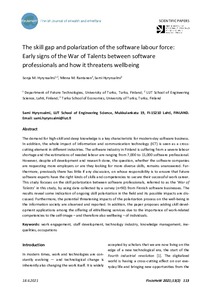The skill gap and polarization of the software labour force : early signs of the War of Talents between software professionals and how it threatens wellbeing
Hyrynsalmi Sonja M; Rantanen Minna M; Hyrynsalmi Sami
https://urn.fi/URN:NBN:fi-fe2021120158427
Tiivistelmä
The demand for high-skill and deep knowledge is a key characteristic for modern-day software business. In addition, the whole impact of information and communication technology (ICT) is seen as a cross-cutting element in different industries. The software industry in Finland is suffering from a severe labour shortage and the estimations of needed labour are ranging from 7,000 to 15,000 software professional. However, despite all development and research done, the question, whether the software companies are requesting more employers or are they looking for more diverse skills, remains unanswered. Furthermore, previously there has little if any discussion, on whose responsibility is to ensure that future software experts have the right kinds of skills and competencies to secure their successful work career. This study focuses on the skill polarization between software professionals, referred to as the ‘War of Talents’ in this study, by using data collected by a survey (n=90) from Finnish software businesses. The results reveal some indication of ongoing skill polarization in the field and its possible impacts are discussed. Furthermore, the potential threatening impacts of the polarization process on the well-being in the information society are observed and reported. In addition, the paper proposes adding skill development applications among the offering of eWellbeing services due to the importance of work-related competencies to the self-image – and therefore also wellbeing – of individuals.
Kokoelmat
- Rinnakkaistallenteet [29335]
